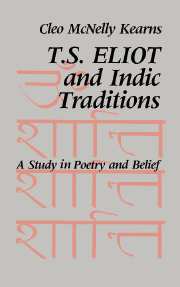8 - Wisdom in Four Quartets
Published online by Cambridge University Press: 07 October 2011
Summary
The token that a philosophy is true is, I think, the fact that it brings us to the exact point from which we started. We shall be enriched, I trust, by our experiences on the Great Tour, but we shall not have been allowed to convey any material treasures through the Custom House. And the wisdom which we shall have acquired will not be part of the argument which brings us to the conclusion; it is not part of the book but is written in pencil on the flyleaf.
T. S. EliotTHE FOUR QUARTETS gain their strength in part from a subtle and sustained coordination of different and indeed at times opposed religious and philosophical traditions. These are brought together in a way that makes less of their oppositions and disjunctures than of their capacity to indicate or suggest by their very differences a third point of view. The result is neither an exploraion of dissonance (a marked effect in The Waste Land) nor a completely harmonized synthetic vision, but rather something between the two – counterpoint, perhaps, or fugue. Here, more than in any other work, Eliot seeks, defines by negation and contrast, and eventually finds the voice of Wisdom, greater always than her “actualization” in any single human soul, a voice the result of a “native gift of intuition, ripened and given application by experience, for understanding the nature of things, certainly of living things, most certainly of the human heart” (OPP 157–8).
- Type
- Chapter
- Information
- T. S. Eliot and Indic TraditionsA Study in Poetry and Belief, pp. 230 - 266Publisher: Cambridge University PressPrint publication year: 1987



